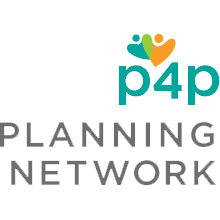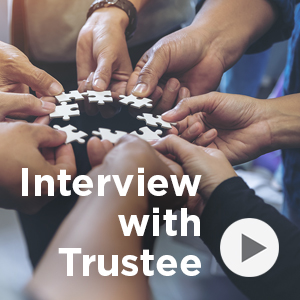
UNDERSTANDING THE ROLES AND RESPONSIBILITIES OF TRUSTEES
UNDERSTANDING THE ROLES AND RESPONSIBILITIES OF TRUSTEES
One of the biggest concerns for parents of a loved one with a disability is what will happen when they’re no longer able to support their son or daughter? How can they ensure they'll continue receiving government benefits, and that any assets left to them are managed properly?
While there is no solution that will eliminate the worry completely, caregivers can be proactive by appointing a trustee or group of trustees in their estate plan.
Very few people are aware of what's involved in serving as a trustee. P4P created this guide to provide an overview of who you can appoint as a trustee and the main responsibilities involved.
Estate Planning
Estate Planning
Parents of a child with a disability will no doubt understand the importance of planning for their future. A well thought out estate plan will allow you to maximize the money your child receives and won’t jeopardize their Ontario Disability Support Program (ODSP) benefits. Here are some common terms you may come across when estate planning:
What is an estate?
An estate is everything you own and/or owe - your house, car, investments, debts, personal belongings, etc.
What is an estate plan?
An estate plan is a plan for what will happen to your estate. It can contain many things, including gifts, trusts, and a will.
What is a will?
A will is a legal document with instructions dictating how your estate will be divided, and who will be responsible for doing so.
What is a trust?
A trust is an agreement that allows an individual to leave behind assets (e.g: investments or real estate) for their loved ones with instructions on how those assets are used.
The person receiving the assets is known as the ‘beneficiary’. The person responsible for overseeing the management of assets for the beneficiary is known as the ‘trustee’.
There are many types of trusts that serve different functions. For a person with a disability, a Henson trust is often recommended.
It’s worth noting that it’s not mandatory to have a trust, but in the case of a person with a disability, it’s advisable. We discuss Henson trusts in further detail below.
What is an executor or estate trustee?
An executor or estate trustee is a person named in a will responsible for carrying out the decisions on behalf of the deceased in the will.
What is a trustee?
A trustee is a person named in a will responsible for managing the assets left to a beneficiary that are left in a trust.
For further information, a list of lawyers who specialize in wills and estates for caregivers of individuals with a disability are available in our Professional Services Directory.
Executors vs. Trustees
Executors vs. Trustees
At this point, you may be wondering what the difference between an executor and a trustee is. Don't they do the same thing?
Not exactly.
An executor takes care of the deceased's estate, but will not do the long-term asset management for a beneficiary.
Similarly, a trustee will not be tasked with executing all of the wishes outlined in a will. He or she will only take care of managing the trust for the beneficiary.
You can think of an executor as someone who liquidates an estate. Once all of the wishes outlined in a will are fulfilled, an executor’s role is finished. A trustee is more like a long-term asset manager for a beneficiary. Their role will be an on-going one and can last for many years.
Henson Trusts
Henson Trusts
A Henson Trust is designed to benefit people with developmental disabilities who receive benefits from the Ontario Disability Support Program (ODSP). It is structured to protect their assets without disrupting their right to collect government benefits.
In Ontario, people eligible for ODSP benefits lose their eligibility if they have liquid assets over $40,000. If they receive an inheritance outside of a trust that puts them over this limit, their benefits may be clawed back and potentially suspended.
However, if the inheritance is held in a Henson Trust, ODSP benefits will continue. Henson Trusts are considered discretionary trusts, which means that the trustees chosen to manage the Henson Trust have absolute discretion over how the funds are used to benefit the beneficiary. That is why parents need to think carefully about who they select as trustees of a Henson Trust.
Parents and caregivers should also be aware that this type of trust can only be established while they are still alive.
Who Can Be Trustees
Who Can Be Trustees
For those wondering, "Who can I appoint as a trustee?", the short answer is: almost anyone. Any person or group of people you want to leave in charge can be a trustee - you aren't restricted to blood relatives.
Many parents choose to appoint a sibling (or siblings) of the individual with the developmental disability. Other families have found success by appointing another relative or a trusted family friend.
The key thing here is 'trust'. The management of a potentially significant amount of money for your loved one is at stake.
Here are some things to consider when appointing a trustee:
- Do you trust this person to manage the beneficiary's affairs responsibly and in an honest manner?
- Where does the trustee live? It's best for a trustee to reside within close proximity of the beneficiary. Ideally, they live in Canada.
- Is the trustee expected to outlive you and expected to live about as long as the beneficiary?
Corporate Trustees
Families without the option of appointing a relative or close friend may consider a Corporate Trustee.
Corporate Trustees are typically trust companies. Many large banks and credit unions have an associated trust company to provide the necessary services.
As with relatives and friends, the question of trust is a key issue when it comes to choosing a corporate trustee. Does the person or company have the right mix of knowledge and awareness of the beneficiary’s needs? Monetary compensation is another factor. While it is appropriate for any trustee to be compensated for their time, appointing a corporate trustee could incur much higher fees. If so, are they worth incurring the extra costs given the value of the assets for the beneficiary?
Multiple Trustees
Many professionals find that appointing multiple trustees is the best option. In this case, you'd have a combination of family members, close friends and a Corporate Trustee. The family members and friends could provide personal support to the beneficiary, while the Corporate Trustee brings professional knowledge needed about the legal and tax side of things.
If you choose to go this multiple trustee route, experts typically recommend a group of three trustees. This is because in the event it’s needed, a third person can break a tie.
There is no one size fits all solution to trusteeship. As with everything, it is best to have an open and honest discussion about the best way forward.
Trustees' Roles
The main role of a trustee is to determine how the funds left behind for the beneficiary are used.
Trustees have a number of responsibilities. Some of these are one-off processes, while others are on-going tasks. As there are many technical issues to consider, it’s worth engaging a team of professionals (lawyers, accountants, financial advisors) to help navigate the process.
We’ve broken down a set of typical responsibilities below:
Once the estate has been administered:
- A lot of the work will be done in the first year, after execution of the will. General tasks could include setting out a plan and establishing all of the various accounts and investment vehicles.
- A trustee will have to go to a bank with a copy of the will or trust deed, where they’ll open a trust account and transfer the funds. This part is important because it validates the person’s role as that of trustee.
- It’s commonplace to open multiple accounts. These could include an everyday chequing account that is easily accessible. This will be used to disperse funds to the beneficiary.
- The trustee can also set up an investment account and deposit a portion of the funds there. They’ll also manage the investments.
On-going responsibilities:
- Administrative tasks, such as managing investments, filing tax returns and ensuring disbursements to the beneficiary align with rules and regulations of the ODSP.
It’s easy to put off decision making and thinking about the future. However, by taking action with their estate planning, parents and caregivers will have peace of mind knowing that their loved ones will have the right support down the road.



